Bursting the Diversity Bubble: Teaching My Mixed Race Child about Race
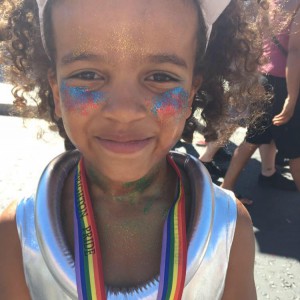
My daughter lives in a diversity bubble and I don’t know when, or how, I should burst it. By this I mean that my daughter, who is 7, lives in a world where diverse races, religions and sexualities all intermingle harmoniously, and is completely unaware that discrimination and bigotry exists.
She has a white Jewish mother and a black Ghanaian father, but all this means to her is she is a caramel coloured brown, a mix of the two. She doesn’t know what races are and therefore doesn’t really know that she is mixed race. We live in the most diverse area in London and the make-up of her school reflects this. Her best friends are mixed race Jamaican-Jewish and another is Indian and white; three other close friends are Muslims. Another is Brazilian. Others are white, others are black. Her teachers and TAs also reflect this mix.
We are fortunate to have had numerous friends live with us over the years. These include people whose origins are as diverse as Chinese, Sri Lankan, Jamaican, Pakistani, Mexican, Brazilian, American and British. Two have been in same sex relationships – one had a Dominican partner and the other a mixed race partner. One was from a Muslim family and took my child to Eid celebrations and taught her to speak Urdu, which went down well with her Pakistani crew. She has one godfather who is Jewish and another who is African American. Her godmothers are both white but one is half French and the other is American. Her god sisters hail from Philadelphia, Gambia, Mexico and Brooklyn and are white, black and mixed race. She has travelled to see them many times and has also spent time in Ghana, Jamaica, Thailand and various European countries such as Greece and France.
I’ve taken her to protests and marches since she was tiny. She knows there are bad people in the world and good people and she knows about people living in poverty and refugees and why we must always help others less fortunate than ourselves. She has a beautiful empathy that leads her to do things like buy food for a homeless man outside Sainsbury’s or canvas for Jeremy Corbyn.
But she doesn’t know about race. Or slavery. Or the 500 years of colonisation and oppression that has led to the current state of world affairs in which some have much whilst others have much less, where elite whites have managed to retain a racialized supremacy over people of colour, where an international slave trade forced an estimated 12.5 million Africans to travel across the Atlantic and where a similar number of residents of Eastern Europe were murdered during the Holocaust, 6 million of whom were Jews.
She is young to be sure, but I question when I should start informing her about these realities. My feelings about the subject are further complicated by my career as an academic in critical race theory, so I study the reality of the racialized world we live in every day. She’s reading now, so I wonder when she will go and read the book covers in my office and notice the themes around race, culture, nationalism, globalisation, mixed race? The questions will soon come and despite my academic expertise in this area, as a parent I’m at a loss of how to best handle it.
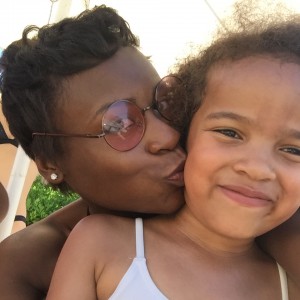
The reality is that she will encounter racism one day. Of that I am sure. And I want her to be prepared for it. I want her to have the tools to recognise, negotiate and combat it. My black friends have all raised their children to do this. The mantra of ‘you have to work twice as hard as white children to get recognition’ is a familiar one. But I’m not sure if this is a mantra I need to instil in my child. I have no doubts that she will succeed in school entirely due to an investment in her education from her father and myself.
I want to protect my child and let her enjoy her childhood innocence for as long as possible, but I also want a ‘woke’ child who is conscious of the reality of the world we live in. At present these seem mutually exclusive. I’m just not sure I’m ready to shake her privileged world view that everyone lives in harmony. I’m not sure what that shake up will do to her psyche. I can’t help but want to protect her from the cruel realities of the world.
But am I doing her a disservice? I have no doubt that we will have these conversations one day, and that she will be raised to fight racism, discrimination and prejudice in all its forms in all the ways she can. That she will be an activist who fights for equality for all. That she will never bow down to another because of her race, class, gender, sexuality or religious beliefs. I aim to raise a social justice warrior. And knowing my daughter, I’m sure she will make me proud.
I do not anticipate my daughter having an identity crisis when she’s older, despite the research that suggests that historically children of mixed race suffer from identity confusion and an inability to culturally identify with one or both of their heritages. Much of this research has been based on the experience of mixed race children being raised by single white mothers with absent fathers, in last century UK, often living in environments devoid of people of a similar racial background. Current literature on the experience of mixed race children points to changing dynamics – societal acceptance of interracial marriages, less social stigmatisation, more mixed race children growing up middle class, more children being raised in two parent families, more diverse geographical environments and so on. Given the distinct socio-economic and cultural environment my child is being raised in – access to both parents, highly diverse friendship groups, travel to her countries of heritage – I don’t fear that she will suffer from identity confusion, or at least, no more so than young people experience in general.
There have also been expectations that mixed race children with one African or Afro-Caribbean parent should self-identify as black due to society seeing them as black and exclusion from whiteness due to the rule of hypodescent, also known as the one-drop rule, prevalent in America. There is also pressure for mixed race individuals to self-identify as black for political reasons in solidarity with the struggle of black people. Should my daughter choose to self-identify as black I would have no problem with it. I will support whatever identity she chooses and I’m sure, as with everyone, her identity formation will be dynamic and change with age. However, mixed race individuals have at times made demands for the freedom to self-identify as mixed race or dual heritage in order to not negate the white side of their family. I cannot imagine my child wanting to distance herself from me as her mother and the identity characteristics I bring to her heritage. Although we are not practicing Jews, Jewishness is matrilineal and ethnically, my daughter is half Jewish. I would hope that this would be a part, however small, of her ethnic identity in the same way that her Ghanaian heritage is. She may of course refute either or both aspects of this heritage and assimilate into Britishness, despite the exclusionary nature of English identity as equating with whiteness. In her time she will be free to choose her identity and whether that is black, brown, mixed race, dual heritage, Jewish, African, “Jewfrican” or British I will support her freedom to identify as she wishes. But I know she will never, and could never, identify as just white.
There has also been research that shows mixed race young people who report and recognise racism have parents that regularly discuss racism with them. Conversely some mixed race young people whose parents do not discuss racism with them report not having experienced it. Therefore there is a link, however tenuous, between a recognition of racism as a factor and the experience of it. I wonder if by bringing the concept of racism to my daughter she will begin looking for it in ways that she would not have done had I not brought it to her attention. This is not to suggest that those aware of racism go looking for it and call it when it is not there – I do not doubt the many micro and macro aggressions that people of colour face in racist societies such as the UK and the US every day. However, I don’t know whether she is emotionally mature enough to carry the weight of this knowledge with her. I worry that it will overburden her at a time in her life when it is not yet pertinent, and that by waiting to bring these concepts to her attention she will not suffer unnecessarily.
As Frances Winddance-Twine argues: ‘Individuals who self-identify as black generally learn within the family at an early age to maintain a certain suspicion and social distance with non-blacks’. I don’t deem it necessary nor do I want my child to be suspicious of white people, or feel she must censor herself in certain situations. However, I have learnt as a racially literate white scholar that some people do not wish to discuss race, including my own mother. However, I do not feel that my child should censor herself, with her grandmother or anyone else.
I wanted to take her to see the film Hidden Figures recently, knowing that seeing women succeed in a male-dominated world of maths and science would resonate with her. But I realised that if I did we would have to have the discussion about race, because she would be dumbfounded that a black woman was not allowed to use a bathroom (or any of the other racialized incidents that occur towards the women in the film). Like literally. She would have no basis upon which to conceptualise not being allowed to use a bathroom. Not to mention the conversation we would then have to have about the whitewashing of history, regarding the fallacious scene in which a man knocks down the ‘coloureds only’ sign (which did not occur in real life – in reality, the protagonist used the damn whites only bathroom, but you know how a patriarchal and racist society wants to position the white man as saviour!)
I have no doubt that we will have all these conversations, but my question is when, and how. In thinking about this I’m forced to ask some discomforting questions about myself and my own background, which is problematizing my belief in my being ‘woke’. Do I have this fear because I’m white? If I was a black mother would I feel differently? Would I have been raised with these tools myself and therefore unconsciously transmit them to my child without having to necessarily think about it? Would it be taken for granted that my child would have these tools if she were being raised in an exclusively black family? Sadly, my daughter does not have much contact with her paternal grandparents, but there is no lack of black people in her life. Her father and I co-parent, and we currently live with a friend who has grown up in a black family from the Caribbean, not to mention all the other black mummies and daddies and friends she hangs out with.
Or is it because my daughter is privileged that this hasn’t come up yet? Would things be different if we lived on an estate or in an impoverished neighbourhood? Would this conversation be forced on us much more quickly? Would she have seen or suffered racialized abuse already? Racist abuse is much more frequent in council estates than leafy suburban streets in Brent, but is that a class-based assumption too? Is class at the heart of this? Does the fact that my friendship group – diverse as it is – tend towards a cosmopolitan, liberal, leftist bent that we (or maybe just I) are not inured to racism? Is it that we do not inhabit racist spaces? Places where race plays out in much more obvious ways? Or do I subconsciously believe that her class position will mitigate against her racial position? It’s hard to answer these questions, but they’re constantly on my mind.
This is part of a broader conversation about discussing racism with children. I recently shared an article on social media called ‘Are We Raising Racists?’ by Jennifer Harvey at the New York Times which reflected on the need for people, especially white people, to sensitively raise issues about race with their children to ensure we raise a future generation of non-prejudiced kids. Particularly in light of Trump’s presidency and the messages his behaviour sends out (not to mention all his supporters who unashamedly perpetuate racism, xenophobia, unbridled patriotism and more). I couldn’t agree more. Race is not the problem of minorities, it is the result of a world system that has perpetuated and maintained white supremacy, and the onus is on white people to resist and contest that. And as a white mother of a mixed race child whose career is based on writing about race, I aim to be at the forefront of that activism.
Perhaps the issues around race need to be posited within a conversation around differences in general, rather than emphasising that as the primary divide amongst human beings. Teaching my child that difference is something to be respected, appreciated and promoted is something that I already do without thought. Explaining to her that differences have been used as a form of oppression and that that is what needs to be resisted is perhaps a good way of breaking down these concepts in a form that a seven-year-old can understand. That people fear what they are unfamiliar with. That sometimes people treat people badly because they come from a different country, or have a different religion, or want to have relationships with someone of the same gender, or want to be a different sex than the one they are born into. And that people have historically treated people badly because they have a different colour of skin. And maybe that’s enough for now, and further conversations can occur organically from that basis.
My daughter may come from affluence but in my mind her true wealth comes from the levels of cultural capital she has acquired through this melting pot of difference she has lived her whole life. It is my hope and belief that this is what will mitigate against any racism she will experience.
She doesn’t know what homogeneity looks like, let alone what it means. And that can only be a good thing.
Nat Illumine

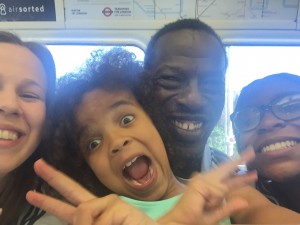
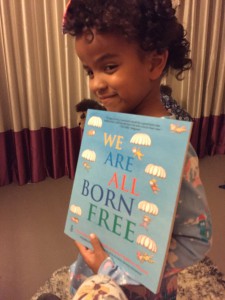

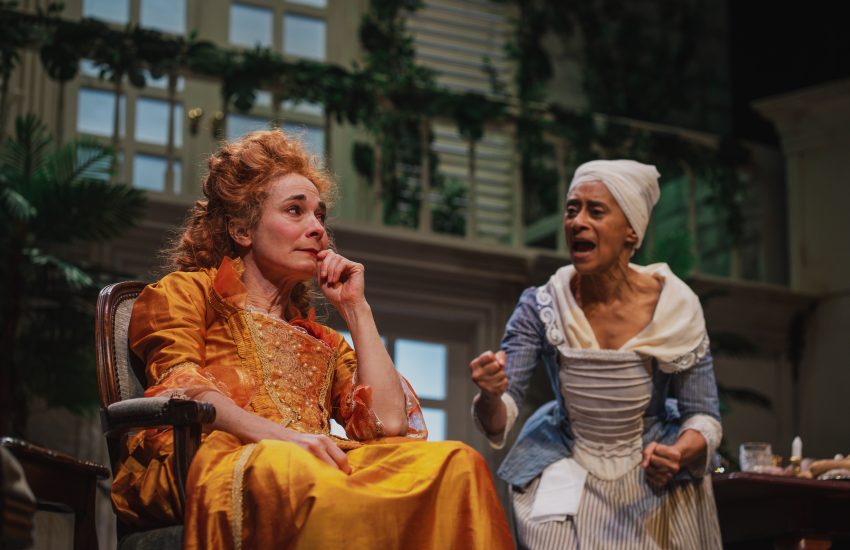
I’ve thoroughly enjoyed reading this post. Smart, considered and what an incredible role model you are, raising the future of our people to have such an educated, open mind and heart. You raise many interesting and important points throughout. Thought provoking.
Thank you for such brilliant words. I would hope to install similar notions to my children— when I have them.
Hi Lacey,
Thank you for your comment, and happy my article resonated with you! My daughter is now two years older than when I wrote this article, and some of those questions I had have been resolved with time and maturity but it’s still something I think about a lot. Sending blessings to you and yours.
Thanks, Nat x